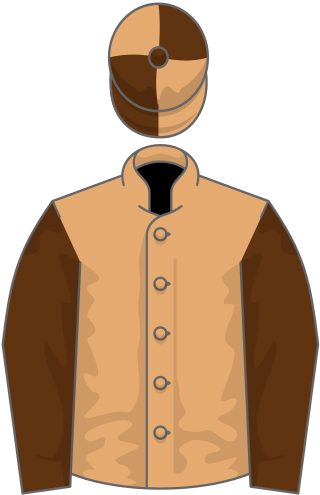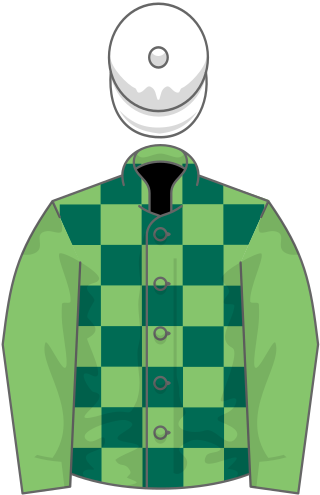Dahlia was an American-bred Thoroughbred racehorse and broodmare. She won major races in France, England, Ireland, Canada, and the United States. She was the first Thoroughbred mare to earn more than $1 million and was one of the pioneers of inter-continental racing.

Roberto was an American-bred, Irish-trained Thoroughbred racehorse. In a career that lasted from 1971 until July 1973, he ran fourteen times and won seven races. He was the best Irish two-year-old of 1971, when his victories included the National Stakes. As a three-year-old, he won the Derby before recording a famous victory over Brigadier Gerard in the inaugural running of the Benson and Hedges Gold Cup. This is regarded by many experts to have been one of the greatest ever performances on a European racecourse. He won the Coronation Cup as a four-year-old before being retired to stud. Roberto had fragile knees and required a left-handed track to perform to his best; he never won going right-handed. He was described by Lester Piggott as " a champion when things were in his favour". Roberto also proved to be a highly successful and influential stallion.
Angel A. Penna Sr. was an Argentine-born U. S. Racing Hall of Fame Thoroughbred horse trainer. Penna was an international trainer who worked and raced on three continents. He conditioned more than 250 graded stakes race winners during a career that began in 1950 and lasted for more than forty years.

Rheingold (1969–1990) was an Irish Thoroughbred racehorse best known as the winner of France's most prestigious race, the Prix de l'Arc de Triomphe.

Empery was an American-bred, French-trained racehorse best known for winning the 1976 Epsom Derby. In a racing career which lasted from September 1975 until July 1976 he ran eight times and won two races. Empery showed some good form in France to be placed third in the Prix Lupin but appeared to be some way below the best colts in his own country. He comfortably defeated the best of the British colts in the Derby to give his jockey Lester Piggott a seventh win in the race. Empery finished second in his only subsequent start and was retired to a stud career of limited success.
Rose Bowl (1972–1994) was an American-bred, British-trained Thoroughbred racehorse and broodmare. In a racing career which lasted from September 1974 until November 1976 she won six of her fourteen races and established herself as one of the best British race mares of the 1970s. After winning once as a two-year-old she won the Nell Gwyn Stakes on her first run in 1975 and then appeared to be a very unlucky loser of the 1000 Guineas. She returned from injury to show her best form in autumn, winning the Queen Elizabeth II Stakes over one mile and then defeated a top-class international field in the ten furlong Champion Stakes. She won a second Queen Elizabeth II Stakes and was narrowly beaten in the Champion Stakes in 1976, when her season was again disrupted by injury. She was then retired from racing and became a successful and influential broodmare.
Argument was a French Thoroughbred racehorse and sire. In his early racing career he showed consistent form and was placed in several important races, but showed marked improvement in the autumn of 1980. He was considered an unlucky loser when narrowly beaten in the Prix de l'Arc de Triomphe and then traveled to the United States where he won the Washington, D.C. International Stakes. At the end of the year he was officially the best racehorse trained in France. In the following spring he won the Prix d'Harcourt and Prix Ganay but his form deteriorated thereafter and he was beaten in his remaining six races. He made no impact as a sire of winners.
Acamas was a British-bred French-trained Thoroughbred racehorse and sire. The last notable horse owned by the French breeder Marcel Boussac he showed promise as a two-year-old in 1977 when he finished a close third in the Grand Critérium. He reached his peak in the following year when he won the Prix Lupin and the Prix du Jockey Club, coming from an apparently impossible position in the latter race. He then finished second in the King George VI and Queen Elizabeth Stakes in England, but was later disqualified after failing a dope test. At the end of his three-year-old season he was retired to stud but proved largely infertile.
The 1977 Prix de l'Arc de Triomphe was a horse race held at Longchamp on Sunday 2 October 1977. It was the 56th running of the Prix de l'Arc de Triomphe.
Durtal was an Irish-bred, British-trained Thoroughbred racehorse and broodmare. She was the best British-trained two-year-old filly of 1976 when she won three of her five races including the Cheveley Park Stakes, and finished second in both the Lowther Stakes and the Champagne Stakes. In the following year she won the Fred Darling Stakes and finished second in the Poule d'Essai des Pouliches before being injured shortly before the start of the Oaks Stakes, a race for which she had been favourite. After one more race she was retired from racing and became a successful broodmare, producing the dual Ascot Gold Cup winner Gildoran and the Royal Hunt Cup winner True Panache.
The 1975 Prix de l'Arc de Triomphe was a horse race held at Longchamp on Sunday 5 October 1975. It was the 54th running of the Prix de l'Arc de Triomphe.
The 1974 Prix de l'Arc de Triomphe was a horse race held at Longchamp on Sunday 6 October 1974. It was the 53rd running of the Prix de l'Arc de Triomphe.
Nobiliary was an American-bred, French-trained Thoroughbred racehorse and broodmare. She recorded her biggest win in the Washington, D.C.International in 1975, a year in which she became the only filly since 1916 to finish placed in the Derby Stakes. As a two-year-old she won one minor race but showed promised when finishing sixth in the Grand Critérium and third in the Prix des Réservoirs. In the following year she won the Group Three Prix de la Grotte and was thereafter campaigned exclusively in Group One/ Grade I company. She won the Prix Saint-Alary and was placed in the Poule d'Essai des Pouliches, Epsom Derby, Irish Oaks and Prix Vermeille before ending her career with a win in the Washington, D.C.International. She had no success as a broodmare, producing only two foals.
Comtesse de Loir was a French Thoroughbred racehorse and broodmare. In her three-year racing career, she won only one important race, the Prix Saint-Alary in 1974. but was placed in numerous major events including the Critérium des Pouliches, Prix de Diane, Prix Vermeille, Prix de l'Arc de Triomphe (twice), Prix Ganay, Canadian International Stakes and Washington, D.C. International. Her performance in the 1973 Arc, when she was beaten a head by Allez France, saw her rated the best three-year-old of either sex to race in Europe that year.
Buoy was a British Thoroughbred racehorse and sire. Unraced as a two-year-old, he proved himself one of the best middle-distance colts of his generation in 1973 when he won the Predominate Stakes and the Great Voltigeur Stakes and finished placed in both the Irish Derby and the St Leger. He was even better as a four-year-old, winning the Yorkshire Cup before beating the outstanding French filly Dahlia in the Coronation Cup and taking the Princess of Wales's Stakes. His career was ended by injury in August 1974 and he was exported to stand as a breeding stallion where he had limited success as a sire of winners.
Malacate was an American-bred, French-trained Thoroughbred racehorse and sire. He showed some promise as a two-year-old in 1975, before emerging as one of the leading colts of his generation in Europe in the following year. His performances in 1976 included wins in the Prix La Force, Irish Derby and the first running of the Joe McGrath Memorial Stakes, in addition to running well in races such as the Prix du Jockey Club, King George VI and Queen Elizabeth Stakes and Champion Stakes. After failing in his first season at stud he returned to racing in 1977 and won the Prix Foy. He was then retired for a second time and had some success as a sire or winners in Japan.
Ace of Aces was an American-bred French-trained Thoroughbred racehorse and sire. He showed modest ability as a three-year-old in 1973, winning one minor event from seven races. He began the following year as a pacemaker for his more highly regarded stable companions but soon developed into a high-class sprinter-miler, recording his first major win in the Prix du Chemin de Fer du Nord. He was then sent to England and scored the biggest win of his career when winning the Sussex Stakes. He went on to win the Oettingen-Rennen in Germany and was narrowly beaten in the Prix de l'Abbaye before being retired from racing at the end of the year. He stood as a breeding stallion in the United States and New Zealand but was not a success as a sire of winners.
Moulton was a British Thoroughbred racehorse and sire. After finishing unplaced on his only start as a juvenile, Moulton improved to become a high-class middle-distance performer in 1972, winning the White Rose Stakes, Prix Ridgway and Prix Henri Delamarre as well as placing second in the Dante Stakes and the Prix du Prince d'Orange. He reached his peak as a four-year-old in 1973 when he won the Premio Presidente della Repubblica and finished second in the Eclipse Stakes before recording a 14/1 upset win in the Benson and Hedges Gold Cup. He was retired from racing and had limited success as a breeding stallion.
Scottish Rifle was an Irish-bred British-trained Thoroughbred racehorse and sire. After winning one minor race as a juvenile he emerged as a top-class middle distance colt in 1972, winning the Predominate Stakes, Gordon Stakes and March Stakes as well as finishing second in the Irish Derby. He reached his peak as a four-year-old in 1973, winning the Earl of Sefton Stakes, Brigadier Gerard Stakes, Westbury Stakes, Eclipse Stakes and Cumberland Lodge Stakes. He also finished second in the Prince of Wales's Stakes and the Benson and Hedges Gold Cup and ran third in the Washington D C International. After his retirement from racing he stood as a breeding stallion in England and Czechoslovakia but had little success as a sire of winners. He died in 1984.
Meneval was an American-bred Thoroughbred racehorse and sire. Bred in Kentucky and sent to race in Ireland as a yearling and showed considerable promise when finishing second on his only start as a two-year-old in 1975. In the following year he was undefeated in four starts, winning the Ballysax Stakes, Nijinsky Stakes and Gallinule Stakes in spring and then returning after a lengthy break to record his biggest victory in the Irish St. Leger. As a four-year-old he won the Hardwicke Stakes but failed to live up to expectations that he would become a leading contender for the Prix de l'Arc de Triomphe. He failed to reproduce his European form when campaigned in the United States in 1978. He later stood as a breeding stallion in the United States and Ireland but had little success as a sire of winners.


